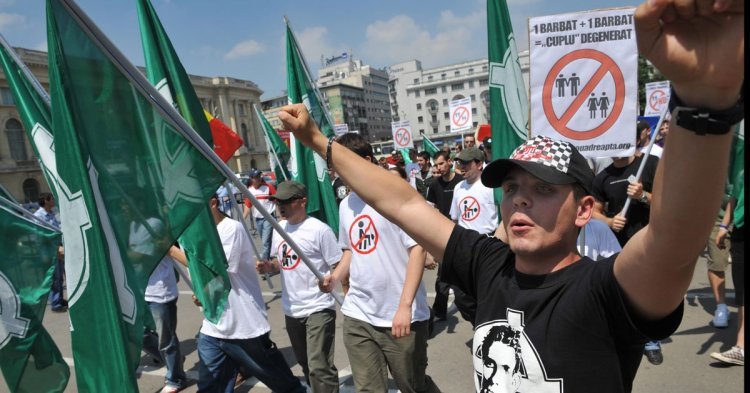Europe is currently going through what we could call a rough period, with extremism on the rise. Moreover, in the last couple of years, there has been quite a drift from the European values and the rule of law in the states which joined the European Union in the last 20 years, such as Poland, Hungary and lately, the Czech Republic.
We know what led to the growing popularity of far-right parties in western countries, but what about the others? Is the rise of far-right extremism normal in post-communist countries? In this article, I will focus on an interesting case in particular, namely, Romania.
The fact is that Romania doesn’t have a far-right leader or party in power, nor in the parliament. In the past, there has been one party, PRM, which was the closest Romania got to the far right in its post-communist history. And while the leader was extremely vocal on the political scene, the party itself never got enough seats in the parliament to influence the decisions.
Skipping to April 2015, a party called Romania United Party (PRU) was founded by ex-members of PRM. The party opposed the acceptance of refugees, same-sex marriage and the adoption of Euro as the official currency in Romania. However, this party hasn’t gathered enough support to occupy any seats in the parliamentary elections in December 2016.
Far-right parties exist in Romania, but they don’t really have any influence and they will certainly not reach the level of Alternative für Deutschland in Germany anytime soon. One thing about the Romanian politics is that the so-called ‘mainstream’ parties such as the Social Democratic Party and the Liberal Party gather most of the public attention, thus not allowing the newer, radical parties to gather a platform to make themselves known. But is the lack of far-right parties a sign that Romania is safe from extremism?
The answer is no. On the political level, there might be a lack of it, but the movements with xenophobic, anti-LGBT+ and anti-progressive initiatives are present and have quite a following in Romania, even among the members of the big parties.
For example, the Coalition for Family (Coalitia pentru familie, in Romanian) demands the change of constitution for a homophobic goal. Currently, in the constitution of the country, marriage is defined as being ’founded through the free willingly agreement between spouses’. The Coalition for Family wished to change the gender-neutral term ‘spouses’ to ‘man and woman’. By May 2016 the coalition had gathered over 3 million signatures, and their initiative supported by the Romanian Orthodox Church. On 20 July 2016, the nine judges of the Constitutional Court ruled unanimously that the proposal to change the constitution’s definition of marriage was valid.
There have also been violent actions, not only against the LGBT community but also against racial and national minorities in the country. The problem with these acts of violence is that they are rarely documented properly in the official data. They mostly get attention and the culprits are sanctioned if the media speaks about it. The so-called ‘anti-protests’ are mostly arranged by associations and organizations such as ‘The New Right’, a nationalistic and eurosceptic association turned political party.
When it comes to acceptance of minorities, Romania is quite the paradox. At the political level, there are spots in the parliament reserved for the representatives of almost all national minorities, not counting UDMR (The Democratic Union of Hungarians in Romania) which always gets more seats in the Senate and the Chamber of Deputies due to the higher number of votes. However, when it comes to the treatment of the minorities by the people, many face discrimination, especially the rroma people.
How does it all tie into Romania’s relationship with the EU and euroscepticism?
Unfortunately, it shows how Romania is going backward rather than forward. While Germany officially recognizes a third gender, Romania can’t even recognize officially the marriage between a same-sex couple which took place in Belgium, going against the right to free movement. It seems that instead of progressing towards more open-mindedness and acceptance, the country is struggling with a war of opinions and beliefs. It can’t necessarily be characterized as a war between generations either. While a good part of the youth is more open-minded, there are still many who harbor what could be considered old-fashioned views.
But the real problem here is education - or the lack thereof. The country is having serious problems when it comes to the level of the education of the population, especially in rural areas, thus making them easier to manipulate. And, unfortunately, misinformation is widespread when it comes to the news and a good part of the Romanians are not aware of the benefits brought by being part of the European Union. There is also the fact that the corruption and bureaucracy are a real problem when it comes to accessing, applying and receiving European funds.
When the perks of being an EU member state aren’t visible to most of the population there is no wonder why, in polls, Romania ranks 3rd least satisfied with being part of the European Union. Moreover, there is an anti-EU speech circulating in the public sphere and on the social media, trying to shift the blame for the economic state of the country from corrupted politicians to international companies which have opened branches in Romania, ‘brainwashed’ the youth and took over the economy, not allowing national companies to develop.
Misinformation about the European Union, combined with the bad economy and tiredness when it comes to the political class are creating a fitting environment for the rise of extremism and could lead Romania in a direction opposite to the principles of the European Union. We are currently seeing how that is going for the Visegrád countries and seeing more countries falling into that type of anti-EU narrative is certainly undesirable.
A strong campaign for the information of the population is required in order to counter and combat the anti-EU speech and make more citizens aware of the benefits we have as a member state of the European Union, before a possible fallout.



1. On 18 April 2018 at 03:48, by tiby Replying to: Romania, extremism and euroscepticism
Replying to: Romania, extremism and euroscepticism
It is very easy to judge the poorest people in EU, when you are living in the richest country of EU !!!?
Follow the comments: |
|
